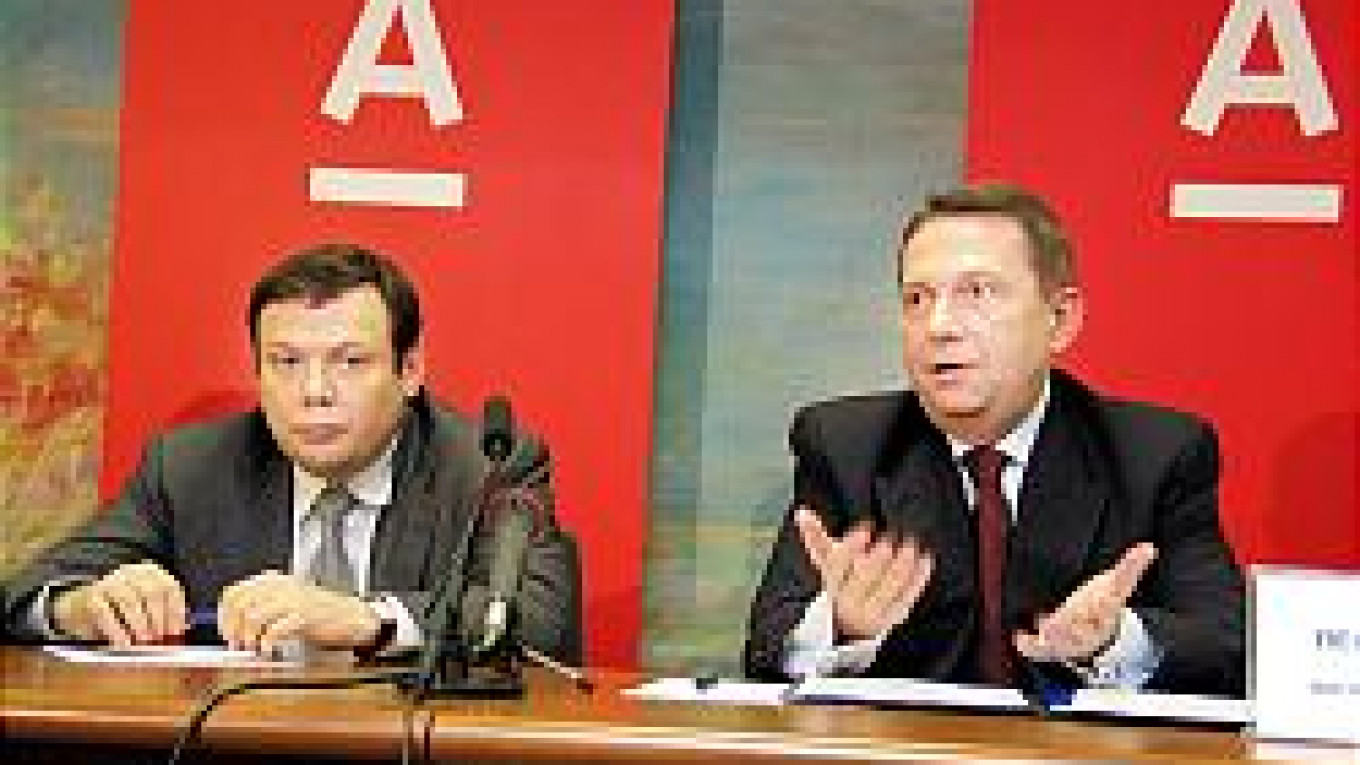On Wednesday, in what company chairman Mikhail Fridman called the beginning of "a revolution" in Russian banking, Alfa Bank unveiled its ambitious Alfa Express project to open dozens of full-service, modern retail centers in the capital and throughout the country over the next several years. The move came a day after retail newcomer Citibank, a subsidiary of U.S. giant Citigroup, launched its first unsecured loan products.
"This project is not only crucial to the future of Alfa Bank, but it can be considered a revolution for the local banking sector in general," Fridman told reporters.
Fridman said that while the market for corporate banking has already been divvied up, making growth in that direction practically impossible, "the growth potential of the retail market is unlimited."
After spending some 18 months and $40 million on the Alfa Express project, including infrastructure and advice from Western consultants McKinsey and Accenture, the bank is ready to offer Russians the best possible retail services available, Fridman said.
The target is a consumer credit market that is growing exponentially. Consumer lending was virtually nonexistent just a few years ago and has ballooned from total lending of some 10 billion rubles at the beginning of 1999 to more than 120 billion rubles now, said Richard Hainsworth, banking analyst at Renaissance Capital.
"With interest rates falling and consumer confidence rising, the most obvious constraint is the availability of credit providers," Hainsworth said in a research note to clients Wednesday.
Ironically, the man hired by Alfa Bank to create Alfa Express is the same man credited with making Citibank a retail force in Poland.
Maciej Lebkovski spent years building up the retail operations of Poland's Handlowy bank, which Citibank bought in 2001. Now, as the driving force behind Alfa Express, Lebkovski, who is deputy board chairman of Alfa Bank, sees Citibank as his main competitor.
Lebkovski said the bank is targeting a broad range of clients, from low-income students to small and medium-size companies and wealthy individuals. Like Citibank, he said, Alfa Express gives its retail clients access to a wide variety of retail products and plans to launch telephone and Internet services later this year.
"We already have 11 branches in Moscow and are planning to open 10 to 15 more by the end of this year," Lebkovski said. "We will also expand into the regions starting next year."
Alfa Bank, which has more than 450,000 retail clients in 50 regions and $1 billion in deposits, expects its share of the retail market, which is dominated by state-owned Sberbank, to at least double from the current 3 percent within the next three years.
Citibank, which has opened 8,000 accounts and 26 mini-outlets since it launched its retail operations in Moscow in December, welcomed the competition.
"We think that our entrance to the retail market made other banks improve their services and move faster in the same direction," a Citibank spokeswoman said, adding that Citibank views Alfa Bank as one of its main competitors.
The banks said, however, that they are targeting different clients and have different goals, and analysts agreed.
"Citibank will never consider the Russian market a priority," Fridman said, adding that Alfa is ready to fight for supremacy in its home market.
"Sberbank remains the major constraint to the development of retail business by commercial banks in Russia," Fridman said, referring to Sberbank's privileged position as the only bank whose deposits are guaranteed by the government.
"But we hope that situation will change as banks improve the quality of their services," he added.
Vladimir Savov, senior banking analyst at Brunswick UBS, said he doubts that Citibank will be able to attract the same broad range of clientele in Russia that it has in the United States.
"Citibank is mostly targeting up-market clients with high incomes, and unlike Alfa Bank, it will be reluctant to expand into the regions," he said.
A Message from The Moscow Times:
Dear readers,
We are facing unprecedented challenges. Russia's Prosecutor General's Office has designated The Moscow Times as an "undesirable" organization, criminalizing our work and putting our staff at risk of prosecution. This follows our earlier unjust labeling as a "foreign agent."
These actions are direct attempts to silence independent journalism in Russia. The authorities claim our work "discredits the decisions of the Russian leadership." We see things differently: we strive to provide accurate, unbiased reporting on Russia.
We, the journalists of The Moscow Times, refuse to be silenced. But to continue our work, we need your help.
Your support, no matter how small, makes a world of difference. If you can, please support us monthly starting from just $2. It's quick to set up, and every contribution makes a significant impact.
By supporting The Moscow Times, you're defending open, independent journalism in the face of repression. Thank you for standing with us.
Remind me later.


